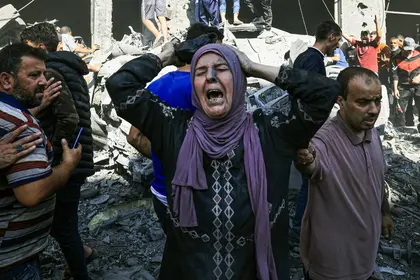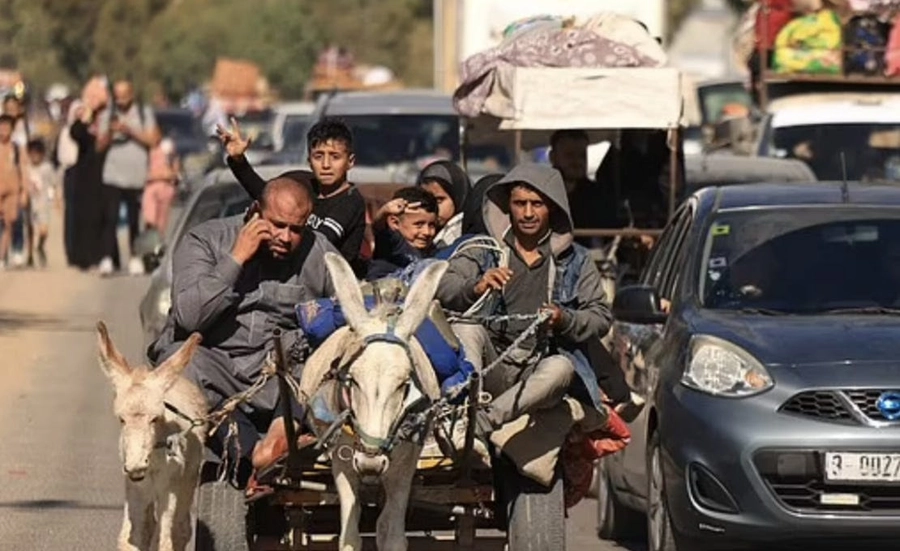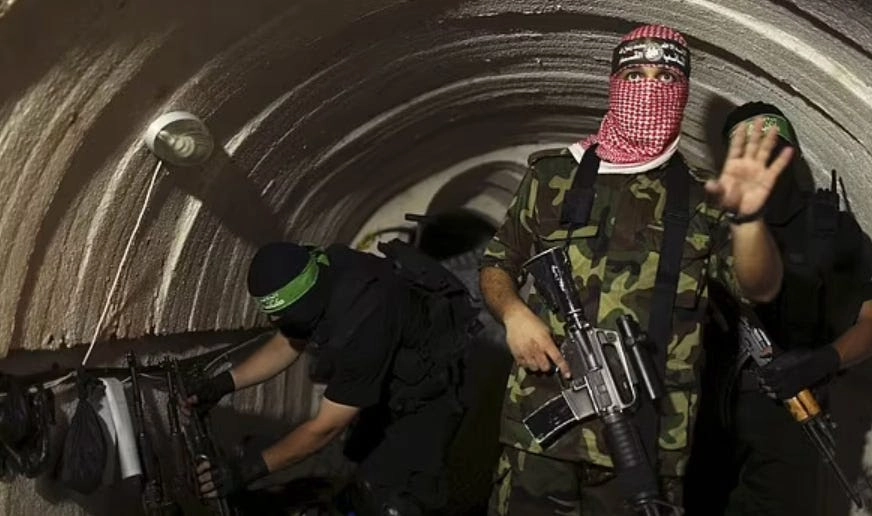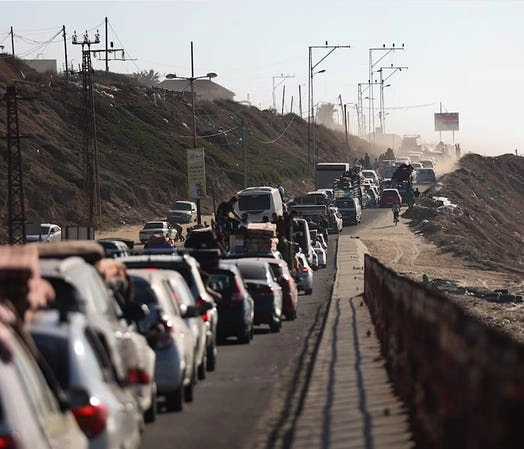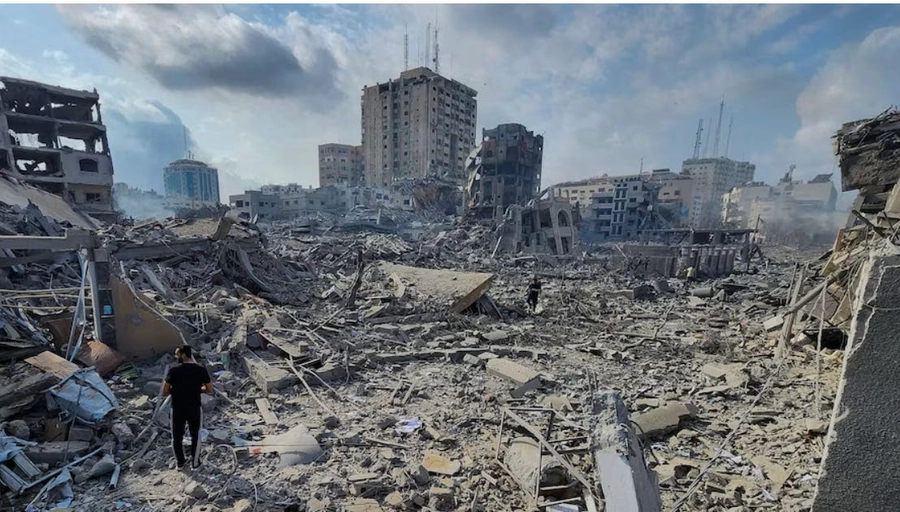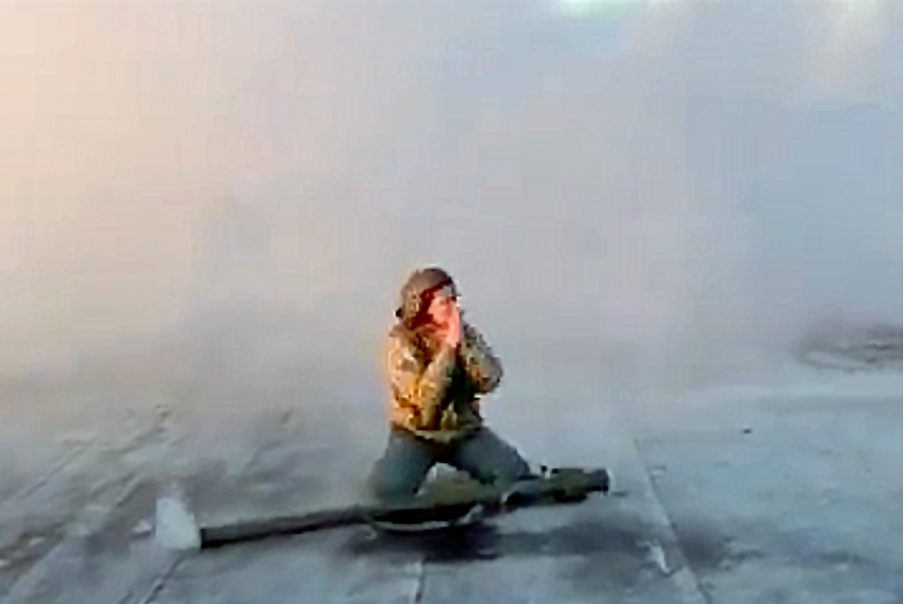Israeli’s legendary leader, Golda Meir, used to assure Israel’s allies that they needn’t worry about the country’s survival against attacks because “we have an advantage…We have nowhere else to go.” However, the same applies to Palestinians living in Gaza today. On October 7, their violent Hamas government massacred and kidnapped Israelis living along their northern border. In retaliation, Israel bombed north Gaza killing thousands of civilians, imposed a siege by banning food, fuel, or medicines, and ordered the million Palestinians in Gaza’s north to evacuate to its southern half so Israeli forces can invade and obliterate Hamas. Hundreds of thousands have been fleeing in cars, on foot or via donkey carts and their sudden arrival, without housing or food, will create a humanitarian crisis. China said the mass expulsion has “gone beyond self-defense”, and United Nations Secretary General António Guterres called on Israel to stop the forced removal. “The grievances felt by the Palestinian people do not justify the terror that was unleashed against civilians in Israel. And the horrific acts by Hamas do not justify responding with collective punishment of the Palestinian people.” Now nations scramble to provide aid and many Israelis question and criticize their government’s draconian crackdown. But they, like Palestinians, have been held hostage for decades by leaders who have failed to find solutions.
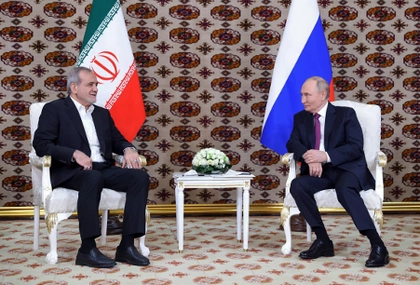
The Future of Russia’s Comprehensive Strategic Partnership with Iran
JOIN US ON TELEGRAM
Follow our coverage of the war on the @Kyivpost_official.
Flight of the desperate
Ironically, Palestinians and Israelis have been perpetually stateless, buffeted by great power politics, wars, and animus. The heinous attack by Hamas on October 7 was barbaric, but the siege and evacuation threatens one million civilians. On October 15, the United Nations designated safe zones in north Gaza such as schools and hospitals for those who cannot evacuate, such as the elderly, infirm, pregnant, disabled, and their medical caregivers. The rest are left to their own devices to leave, a potential catastrophe that, if it unfolds, will diminish Israel’s moral standing globally. Fortunately, on October 13, President Joe Biden said his priority was to work with the United Nations, Israel, Egypt, Jordan, and Arab nations to airlift and deliver aid to Gazans. “We can’t lose sight of the fact that the overwhelming majority of Palestinians had nothing to do with Hamas,” Biden said. “And they’re suffering as a result as well.”
Israel’s new multi-party wartime cabinet, led by its unpopular Prime Minister Benjamin Netanyahu, says it must evict civilians in order to decapitate Hamas, and destroy its huge network of tunnels. Nicknamed the “Gaza Metro”, this subterranean city is dozens of miles long and extends beneath the borders of Israel and Egypt. It’s a fortress that is undetectable from the air, and protected from airstrikes by reinforced concrete. It enables smuggling and is where Hamas controls the local populace, hides hostages, and plans attacks. The terrorist organization also uses civilians as shields which is why, after the evacuation announcement, Hamas ordered Palestinians to stay in place. Most are ignoring its edict.
Hamas’s tunnel terrorists
Everything in the world’s most dangerous neighborhood is complicated, morally as well as legally. At issue is whether Israel has run afoul of international rules, contained in the Laws of Armed Conflict (LOAC). These are based on three principles: Distinction, military necessity, and proportionality. Distinction requires that attacks not be directed against civilians but only against combatants (which is Israeli’s justification behind the evacuation order). But some latitude is allowed if dangerous measures are absolutely necessary to accomplish a legitimate military purpose, backed up by evidence. In that case, civilian deaths are considered collateral damage, not war crimes. Then there is the proportionality principle which forbids military measures to be conducted against civilians and their property if these exceed the military advantage gained. Blowing up an apartment block full of innocent people because one Hamas leader hides there is a war crime unless proven to be essential to achieve legitimate military ends. Thus the evacuation order.
The siege, however, is clearly prohibited under Article 33 of the Geneva Convention, said international lawyer Michael Lynk in an interview with Al Jazeera. It prohibits actions that can cause starvation or deprive people from the necessities of life. Further, he said Israel is considered an “occupying power” when it comes to Gaza which imposes other legal restrictions and obligations under international law. These include obligations to “protect the protected people under occupation” and, even if involved in a conflict, the occupying power (Israel) cannot attack civilians or their property directly or indirectly. Hamas, on the other hand, has perpetrated war crimes for decades.
Ironically, both Israelis and Palestinians distrust and disdain their governments, according to polls. Before the attacks, public support for Netanyahu and his right-wing allies fell and has now collapsed. The vast majority want him and his radical cabinet ministers to resign after the war ends. The same applies in Gaza, according to a poll taken in July by pro-Israel think tank, the Washington Institute for Near East Policy. It revealed that that the majority of Gazans were against Hamas’s decision to break the ceasefire and agreed with a proposal that “Hamas should stop calling for Israel’s destruction and instead accept a permanent two-state solution.”
The July poll also found that 70 percent of Gazans supported a proposal to transfer power from Hamas to the more moderate Palestinian National Authority in the West Bank “with Hamas giving up [its] separate armed units”. The Institute also found that support for Hamas had steadily stopped among many Arab publics and concluded that “this decline in popularity may have been one of the motivating factors behind the group’s decision to attack.”
A flood fleeing north Gaza
Hamas was election in 2006 then became an armed dictatorship. Similarly, Israelis elected Netanyahu who created an ultra-right wing regime which attempted to bridle the country’s Supreme Court. Israelis staged mass protests for weeks, but Gazans have been silenced, and continue to discuss and debate their government’s security lapse, policies, and the political and moral ramifications of its war strategy. For instance, editorialist Gideon Levy, with Haaretz in Israel, wrote sympathetically that “Gaza is plagued with Hamas, and Hamas is a despicable organization. But most residents of the Gaza Strip are not like that. Before we start flattening and destroying and uprooting and killing, we should take this into account. The reckoning must be with Hamas, not with all Gazans. One’s heart must go out to them, regardless of one’s profound solidarity with Israel’s victims. The images from Gaza are already shocking. But most of all, it’s the helplessness of the people who have nowhere to run to, no way to protect their children, nowhere to hide. In Gaza there is no refuge and no way out.”
Many Israelis believe they’ve been abused by their own government, according to Amir Ben-David, a senior editor with The Times of Israel. In his piece, entitled “A Nation Neglected”, he described an angry exchange between the brother of a young Israeli victim of the recent attacks and a cabinet minister who attended his funeral this week. “I apologize to my family that so wanted to keep politics out of this, but I just can’t because politics is what led to the murder of he who is dearest to me. We have been abandoned. My dear brother was slain by murderous, hateful terrorists – and what enabled them, with despicable conduct, was the government of Israel: From the national security minister and his messianic group of clowns, busy chanting violent and divisive slogans; to the prime minister, who has been doing everything he can to fragment the state of Israel.”
One in five Israelis is Arab which is why a Haaretz piece by Hanin Majadli, an Arab-Israeli, provided an important viewpoint and she wrote a piece headlined “No to Collective Punishment for Gaza”. “It is a complex experience [to be an Arab-Israeli] in normal times. It is almost impossible in these times,” she wrote. “I feel it is my duty to object to all the calls for revenge and for blind collective punishment. Cutting off electricity, mass starvation of a civilian population, the total destruction of the heart of Gaza. None of these things is an appropriate response or a solution. These are war crimes.”
“I admit I don’t know what the solution is” she added “but Israel not only did nothing to offer Gazans a horizon of normal life under its military blockade, it did all it could to embitter their lives. Palestinians deserve justice and freedom, and with all my heart I want my people’s liberty not to be soaked in Israelis’ blood, and I dearly hope that there are a few Israelis left who feel the same way.”
By contrast, the Jerusalem Post ran an angry piece by Stewart Weiss who wrote “we must recognize Hamas and Hezbollah and the bulk of the Palestinians for what they indisputably are: The modern-day reincarnation of the Nazis. There is no limit to their evil.”
Israel’s devastation in Gaza October 2023
There is angst felt across both diasporas. The Jewish population in the United States and Canada is roughly the size of Israel’s, or about seven million, and many have dual citizenship. Another 2.8 million Jewish people live in Europe. Currently, there are 14 million Palestinians worldwide, roughly the same number as Jews, but one-third are “refugees” who live in United Nations’ supported camps in Jordan, Lebanon, Syria, Gaza, and the West Bank.
A two-state solution is required but will require international pressure and good will. Hamas, Hezbollah, and Iranian or Russian terrorist activities in the region must end. But de-escalation is essential and must happen immediately or repair may take generations, said Israeli historian Yuval Noah Harari in a CNN interview. “This is historically different. Hamas didn’t try to hide atrocities, but took videos and published them. They are trying to sow seeds of hatred for generations. The aim is to destroy all chance of reconciliation or peace in the area for generations to come. It’s clear people are unable to go back to villages and towns and live again under threat. This is not about intelligence failures. Israel is paying the price for years of neglecting to make any serious attempt for peace with the Palestinians.”
The views expressed in this opinion article are the author’s and not necessarily those of Kyiv Post.
Reprinted from [email protected] - Diane Francis on America and the World
See the original here.
You can also highlight the text and press Ctrl + Enter


